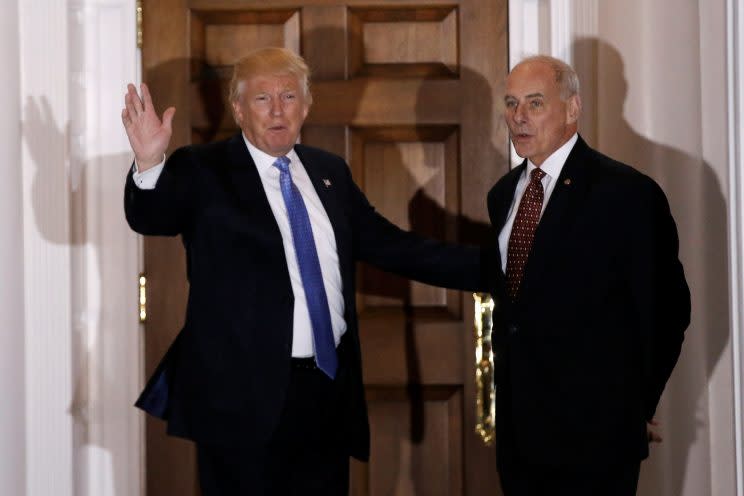John Kelly, Trump’s Homeland Security pick, gave a remarkable speech 4 days after his son died serving in Afghanistan
On Veterans Day in 2010, inside an unremarkable hotel ballroom in St. Louis, Marine Gen. John F. Kelly, delivered what the Washington Post described as “a passionate and at times angry speech about the military’s sacrifices and its troops’ growing sense of isolation from society.”
That he was able to speak at all was remarkable. Four days earlier, Kelly’s 29-year-old son, Marine 1st Lt. Robert Michael Kelly, stepped on a land mine while leading a patrol in southern Afghanistan. He was killed instantly.
John Kelly, President-elect Donald Trump’s reported pick for Homeland Security chief, never spoke of his fallen son by name during the speech to the Semper Fi Society that he had committed to give long before his son’s death. According to the Post, the elder Kelly made one request to the officer who introduced him: “Please don’t mention my son.”
“We are in a life-and-death struggle, but not our whole country,” Kelly said in his speech. “One percent of Americans are touched by this war. Then there is a much smaller club of families who have given all.”
Kelly, 66, is the highest-ranking military officer to lose a child in combat in Iraq or Afghanistan — a burden of war that thousands of so-called Gold Star military families like his must bear.
“The chattering class and all those who doubt America’s intentions, and resolve, endeavor to make them and their families out to be victims, but they are wrong,” he continued. “We who have served and are serving refuse their sympathy. Those of us who have lived in the dirt, sweat and struggle of the arena are not victims and will have none of that.”
The four-star general, whose Marine career spanned five decades and included three tours in Iraq, spoke of the growing divide between civilians and the military, and argued that Americans who don’t serve don’t understand the sacrifices of those who do.
“Those with less of a sense of service to the nation never understand it when men and women of character step forward to look danger and adversity straight in the eye, refusing to blink, or give ground, even to their own deaths,” Kelly said. “The protected can’t begin to understand the price paid so they and their families can sleep safe and free at night. No, they are not victims, but are warriors, your warriors, and warriors are never victims, regardless of how and where they fall. Death, or fear of death, has no power over them. Their paths are paved by sacrifice, sacrifices they gladly make — for you.”
“If anyone thinks you can somehow thank them for their service, and not support the cause for which they fight — America’s survival — then they are lying to themselves and rationalizing away something in their lives,” he said. “But, more importantly, they are slighting our warriors and mocking their commitment to the nation.”
Kelly, like his would-be future boss, took aim at the media for what he called negative coverage of U.S. military actions.
“Yes, we are at war, and are winning, but you wouldn’t know it because successes go unreported,” he said. “And only when something does go sufficiently or is sufficiently controversial, it is highlighted by the media elite that then sets up the ‘know it all’ chattering class to offer their endless criticism. These self-proclaimed experts always seem to know better, but have never themselves been in the arena. We are at war and like it or not, that is a fact. It is not Bush’s war, and it is not Obama’s war, it is our war and we can’t run away from it.”

Today’s troops, Kelly said, “are not born killers, but are good and decent young men and women who for going on 10 years have performed remarkable acts of bravery and selflessness to a cause they have decided is bigger and more important than themselves.”
“Like my own two sons who are Marines and have fought in Iraq, and until this week, Afghanistan, they are also the same kids that drove their cars too fast for your liking,” Kelly said, holding back his tears, “and played the god-awful music of their generation too loud. But have no doubt they are the finest of their generation.”
Kelly, who retired as the head of the U.S. Southern Command earlier this year, spoke openly about his son’s death at his final Pentagon news conference.
“To lose a child is — I can’t imagine anything worse than that. I used to think, when I’d go to all of my trips up to Bethesda, Walter Reed, I’ll go to the funerals with the secretaries of defense, that I could somehow imagine what it would be like,” Kelly said, according to the Associated Press. But, he added, “when you lose one in combat, there’s a — in my opinion — there’s a pride that goes with it, that he didn’t have to be there doing what he was doing. He wanted to be there. He volunteered.”



